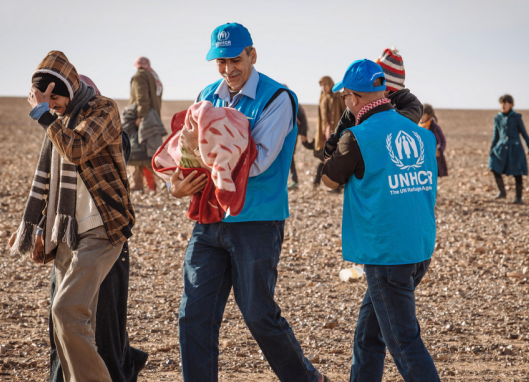Sectors and Working Groups

Inter-Sector Working Group
The ISWG maintains the responsibility to coordinate the sectors within the Refugee Response in Jordan – at the national level and in all field locations and draws on comparative expertise by all stakeholders, supported by an integrated analysis and learning system. The ISWG embraces activities to ensure greater humanitarian-development coherence in adherence of the global commitments made in the Grand Bargain, the Global Compact on Refugees, and the Sustainable Development Goals, particularly the commitment to leave no one behind.Since August 2013, Inter-Agency coordination for the humanitarian response to the Syria crisis in Jordan has been led by UNHCR, supporting an inter-sectoral structure implemented through seven sectors (Education, Food Security and Basic Needs, Health, Economic Empowerment, Shelter, Protection and WASH), as well as several sub-sectors and task forces. Dialogue among all stakeholders involved in the response has been facilitated through additional inter-linked platforms and ad hoc facilitation, including amongst Government, donor community, civil society, and development actors.
ActivityInfo & Reporting
The ISWG structure included reporting guidelines including the definition of roles, responsibilities, and accountability lines for the cohesive and effective delivery of coordination. The available reporting and mapping tools strengthen the cross-sectorial analysis, learning, and information management and better feed programming and advocacy.

Jordan Refugee Response
The Jordan Refugee & Resilience Response (Jordan 3RP) works with a broad range of partners under the framework of the Regional Refugee and Resilience Plan (3RP), and in alignment with the government-led Jordan Response Plan (JRP-2014-2016) to deliver an integrated, multi-sector response to meet the needs of refugees and impacted communities most affected by the crisis. The Jordan 3RP establishes a platform to build the resilience of individuals, families, communities, and state institutions. In total, the Jordan 3RP brings together 52 partners, including the relevant line Ministries, notably the Ministry of Planning and Cooperation (MOPIC), as well as United Nations agencies, and national and international NGOs. Partners engage in a range of mechanisms to coordinate refugee protection and assistance activities at the national level and in the field level. The response will continue to strategically engage with humanitarian and development partners to implement the prioritized activities, including by strengthening the inter-sectorial framework to better achieve the intended impact of the plan.

Mainstreaming
The overall approach to mainstreaming key areas in refugee response is aiming to strengthen all components of the response and reinforce inter-sector linages. The systematic and coherent mainstreaming efforts are crucial to ensure operational comprehensiveness of the coordinated partners’ interventions impacting lives of refugees and host communities.
Gender: The response is gender- and age-responsive, by carefully considering gender and age factors across sectors, ensuring that threats and vulnerabilities are identified and mitigated, priorities of different groups are addressed, needs and approaches are factored into planning and programming, and key results are achieved.
Protection: Protection will remain at the center of planning, design, implementation, and monitoring of all interventions to ensure no one is left behind. While Syrian refugees continue to require access to territory and international protection, working towards durable solutions is critical to the response.

Assessment, Analysis, and Learning Hub AALH
Assessments, Analysis and Learning Hub (AAL Hub) is an interdisciplinary collaborative platform providing strategic and technical guidance for Syria response and organizations working on improving the conditions and lives of vulnerable communities in Jordan.This Hub promotes evidence-based programming and advocacy through stakeholder-represented research, fostering accountable and effective solutions for vulnerable communities, including refugees. Facilitating coordination, best practices, and knowledge exchange, the AAL Hub is the network for informed action and learning.
Socio-Economic Survey on Refugees in Jordan: Vulnerability Assessment Framework (VAF)
The Socio-Economic Survey on Refugees in Jordan: Vulnerability Assessment Framework (VAF) provides an in-depth analysis of various vulnerabilities refugees face and enables tracking of changes in refugees’ living situation over time. Developed through inter-agency collaboration, it integrates data and insights from various sectors, aiming to enhance targeted interventions and facilitate informed decision-making for more effective support.

- Q2- 2024 Socio-Economic Update on Refugees in Jordan. [Report].
- 2024 Socio-Economic Survey on Refugees in Jordan – VAF [Camps Dashboard]
- 2024 Socio-Economic Survey on Refugees in Jordan – VAF [Host Community Dashboard]
- JORDAN : 2024 Socio-Economic Survey on Refugees in Host Communities (VAF) [Report].
- JORDAN : 2024 Socio-Economic Survey on Refugees in Camps (VAF) [Report].

Contact Us








